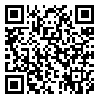BibTeX | RIS | EndNote | Medlars | ProCite | Reference Manager | RefWorks
Send citation to:
URL: http://jdisabilstud.org/article-1-3220-en.html
2- Professor of Psychology, Shahed University, Iran, Tehran
3- Associate Professor of Psychology, Shahed University, Tehran, Iran
4- Assistant Professor of Psychology, Tarbiat Modarres University, Tehran, Iran
Abstract
Background & Objectives: Social anxiety disorder is a prevalent disorder and may affect many areas of daily activities such as relationships, employment, and education. Schema therapy and mindfulness are proven to be successful in treating social anxiety. Mindfulness focuses on a non–judgmental acceptance and awareness of the present moment, emotions, and experiences. Schema therapy focuses on identifying early maladaptive schemas (EMS) and helping clients manage them. Schemas, including mistrust, defectiveness/shame, failure, unrelenting standards, entitlement, and punishment, play a key role in the maintenance of social anxiety disorder. A new protocol called schema mindfulness–based cognitive therapy combined elements of schema therapy and mindfulness. The effectiveness of schema therapy and mindfulness have been investigated separately. Still, the feasibility of both of them in Iranian culture, especially in reducing social anxiety symptoms, increasing mindfulness, and changing early maladaptive schemas, has not been investigated. This study aimed to examine the efficacy of schema mindfulness–based cognitive therapy on decreasing social anxiety symptoms, increasing mindfulness, and improving early maladaptive schemas, including mistrust, defectiveness/shame, failure, unrelenting standards, entitlement, and punishment in two patients.
Methods: This study is a single case study. The samples were selected using available sampling. The research population consisted of all students aged 19 to 30 with social anxiety disorder at Tehran universities, Tehran City, Iran. Two students who were between 19–30 years old and scored 28 or higher on the Social Phobia Inventory (Connor et al., 2000) and were diagnosed with social anxiety using the Structured Clinical Interview for DSM–IV® Axis I Disorders (SCID–I) (First et al., 2010) were selected. Then, they were treated by the study protocol. Participants were assessed on the Five Facet Mindfulness Questionnaire (FFMQ) (Baer et al., 2006) and Young Schema Questionnaire–Short Form 3 (YSQ–S3) (Young & Brown, 2005). They were assessed again after the fourth, eighth, ninth, and tenth sessions. Data were analyzed using level, trend, stability, improvement rate difference (IRD), percentage of data exceeding the median (PEM), percentage of data exceeding the median trend (PEM–T), percentage of non–overlapping data (PND), percentage of overlapping data (POD), reliable change index (RCI), and standard mean difference (SMD) using Software R.
Results: Social anxiety calculations of PND and POD in both participants indicated 100% non–overlap and 0% overlap (PND=%100, POD=0). RCI in social anxiety showed significant changes (RCI= 34.53). SMD in social anxiety indicated the efficacy of the protocol in the improvement of social anxiety (SMD=26.75). Mindfulness calculations of PND and POD in both participants indicated 100% non–overlap and 0% overlap (PND=%100, POD=0). RCI in mindfulness showed significant changes (RCI= 54.54). SMD in mindfulness indicated efficacy in the improvement of social anxiety (SMD=42.25). Regarding the early maladaptive schemas calculations of PND and POD in both participants indicated 100% non–overlap and 0% overlap (PND=%100, POD=0). SMD in all of the early maladaptive schemas showed significant changes (SMD for first and second participants for mistrust schema=6.50, 12.75; SMD for first and second participants for defectiveness/shame schema= 5.25, 9.00; SMD for first and second participants for failure= 6.50, 11.00; SMD for the first and second participants for unrelenting standards= 8.25, 13,50; SMD for the first and second participants for entitlement=6.25, 8.00; SMD for the first and second participants for punishment=5.75, 8.00). RCI in all of the early maladaptive schemas showed significant changes (RCI for the first and second participants for mistrust schema=8.39, 16.46; RCI for first and second participants for defectiveness/shame schema=6.78,11.62; RCI for first and second participants for failure=8.39, 14.20; RCI for the first and second participants for unrelenting standards=10.65,17.43; RCI for the first and second participants for entitlement=8.07, 10.33; RCI for the first and second participants for punishment=7.42, 10.33).
Conclusion: Despite the limitations of this study, positive findings about the efficacy of schema mindfulness–based cognitive therapy on social anxiety can provide a chance to learn more about the protocol.
| Rights and permissions | |
 |
This work is licensed under a Creative Commons Attribution-NonCommercial 4.0 International License. |




